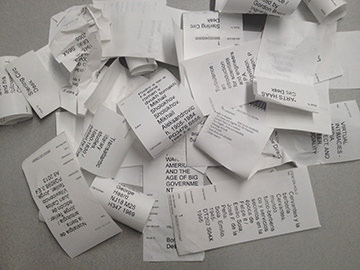A receipt from a grocery store, a library, or any number of other common locales may seem innocuous, but it’s likely made of thermal paper coated with chemicals harmful to human and animal reproductive systems. To address these health issues, the Yale Library Sustainability Advisory Group is working to replace the current thermal paper used within campus libraries with a healthier and more sustainable alternative.
A recent study that tested approximately 150 different businesses and 208 paper receipts, found that 93 percent contained Bisphenol A (BPA) or Bisphenol S (BPS), endocrine-disrupting chemicals that have been associated with reproductive problems.[1] Even briefly touching the receipts can lead to BPA and BPS absorption into the body. Moreover, these receipts can’t be recycled because BPA and BPS can contaminate other materials in the recycling stream. At Yale’s libraries, thermal paper is used for check-out receipts, hold slips, and routing slips.
 The Library Sustainability Advisory Group is working on eliminating use of the current thermal paper by replacing it with a phenol-free product.
The Library Sustainability Advisory Group is working on eliminating use of the current thermal paper by replacing it with a phenol-free product.
“Thermal paper relies on some type of acid for the reaction which makes the words and images show up on the paper,” says Chris Killheffer, Associate Director for Access Services Operations at SML/Bass. “Rather than using a phenol based acid, the acid they, [the vendor], rely on is Vitamin C, so it’s actually a completely nontoxic substitute and recyclable substitute.”
Killheffer recently ordered and tested out rolls of the Vitamin C thermal paper on existing library equipment, and found that they performed well. He is now working on adding the product to SciQuest, Yale’s online purchasing platform, to facilitate the ordering process for all the other university library groups.
This initiative is part of the Group’s larger materials management efforts outlined in the Library Sustainability Action Plan. In addition to phasing out the phenol chemicals in thermal paper, the Group aims to reduce the use of paper at the libraries by 10 percent within three years. Efforts include providing reusable routing slips in place of single-use slips and configuring the check-out system to print fewer receipts. For example, rather than printing five individual receipts if a person checks out five items, only one receipt that lists all five items would print.
Yale is committed to building a more sustainable world. By doing what we do best—integrating science, the humanities, and our community—Yale creates, tests, and adopts innovative solutions to the environmental and social challenges we all face.